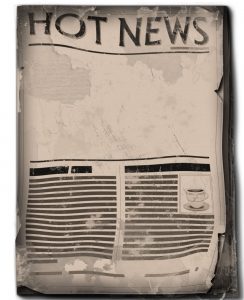Origin, 1932.
The word newsworthy is fairly self-explanatory. It’s adjectival meaning directly describing something that is considered “news + worthy”. My question for today:
What is newsworthy to you?
I picked up a copy of the USA Today (today). The Weekend one. Yes. They lump today, 3/6 together with 7 & 8 in anticipation of news over the weekend.
Today’s copy does encompass the story about the 127 passengers that avoided a near-fatal landing on the front page. Yet, above even this “Icy Escape in New York” heading and parallel to the USA Today Weekend logo is the update of “Harrison Ford hurt in L.A. plane crash…Actor ‘battered’ but OK, son says”.
Given the placement and its proximity to the Today’s logo, it would be appropriate to consider this the most newsworthy update of the weekend, would it not?
Don’t get me wrong. I love Harrison Ford. I’m glad he’s OK. Yes. I love him in pretty much anything he’s ever starred in. But, the gloves must come off somewhere. He’s 70something years old. Had the choice to fly the plane, and even was fortunate enough to come away from the accident OK. His son being able to confirm this might permit it to be enough to call it minor news…tuck it away in Section E of the Entertainment section?
My point for bringing this up is simple. In 1932, the word newsworthy held meaning in its controversial first year. Like most words it suffered from overuse and took on a much less certain definition like words such as “wish” and “hope” do today. Think about what topics come to mind when you hear the word newsworthy in 2015. Does it have something to do with truly spectacular (or sadly, sometimes horrendous) events? Events on both ends of the news spectrum? We know 2015 has events “interesting enough to report to the general public,” and boy, do they. But, let’s keep this word away from lukewarm, everyday overuse.
Here’s a list of some of the newsworthy events that occurred in 1932:
- January: Hattie Carraway of Arkansas becomes the first woman elected to the U. S. Senate; China and Japan go to war again in the January 28 Incident; Aldous Huxley’s novel Brave New World is published;
- February: Japan declares the “independent” state of Manchukuo (Manchuria).
- March: Infant Charles Lindbergh, Jr. is kidnapped; the January 28 incident ends;
- May: Jack Benny’s radio show premieres; the Lindbergh baby is found dead; the Bonus Army of WWI veterans marches on Washington, D. C., demanding payment of the military bonuses promised them;
- June: the U. S. imposes its first tax on gasoline; Germany lifts the ban on the Nazi SS and SA organizations.
- July: the Dow Jones Industrial Average reaches its nadir at 41.22;
- August: Carl Anderson discovers the positron, confirming Paul Dirac’s prediction that it existed.
- September: the Kingdom of Hejaz and Nejd becomes the Kingdom of Saudi Arabia.
- October: Babe Ruth makes his famous “called shot” in game three of the World Series; Britain grants Iraq independence; the “unsinkable” Titanic survivor Molly Brown dies.
- November: Franklin D. Roosevelt is elected president of the United States; German President von Hindenburg almost asks Hitler to form a government, but opts for Kurt Schleicher instead;
- December: the BBC Empire Service, later known as BBC World Service, begins broadcasting; Radio City Music Hall in New York City opens it doors.
**These are all *ahem* newsworthy events. Heck, even April was skipped, I guess, because nothing notable (or, big enough) shook the foundations of journalism that month.
***I’d like to also add that this was the year Oxford English Dictionary gave its first citation of the plural noun “cojones”, found in Hemingway’s 1932 Death in the Afternoon.
Maybe if we choose to become more selective in our descriptions of events (or, even better, more restrained), then, we can discover news again and appreciate it for all of its insight and remarkable coverage.

